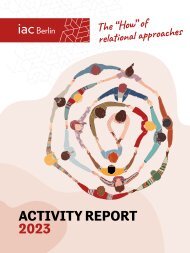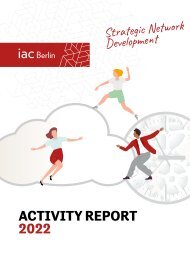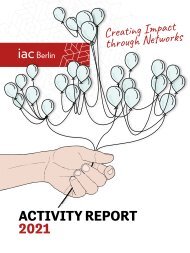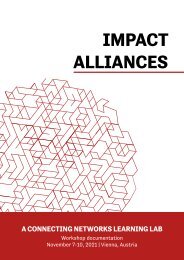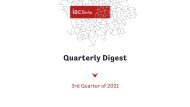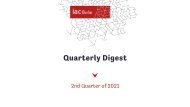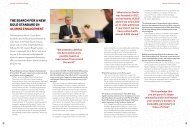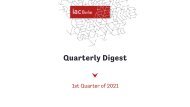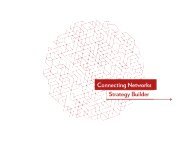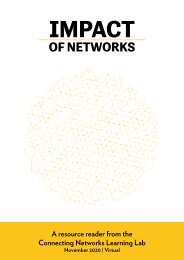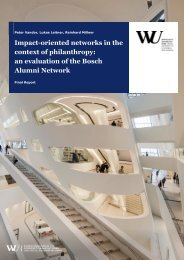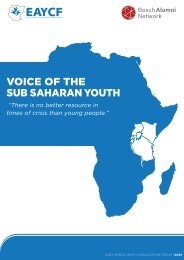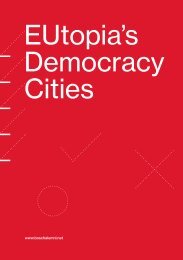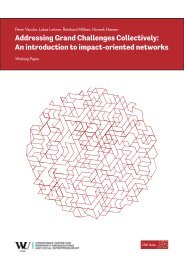iac Berlin - Activity Report 2020
iac Berlin - Activity Report 2020
iac Berlin - Activity Report 2020
Create successful ePaper yourself
Turn your PDF publications into a flip-book with our unique Google optimized e-Paper software.
Interview with Professor Rogall<br />
Interview with Professor Rogall<br />
What could other foundations learn from the experiences gained<br />
by the <strong>iac</strong> <strong>Berlin</strong> so far?<br />
In order to do alumni work well, you need a minimum<br />
number of alumni and you must make a financial<br />
investment. Especially smaller foundations that don’t have<br />
massive resources but are in the early stages of considering<br />
alumni engagement can learn a lot from us. At the same<br />
time, since we’re operating on a global level, we are able to<br />
collect a diverse range of experiences. Not every tool will<br />
work for every foundation, but the more tools you have in<br />
your toolbox, the more flexible you can be. And the initial<br />
concern voiced by some people, that an alumni network<br />
could weaken the sense of belonging to the foundation,<br />
just hasn’t happened. In general, the alumni have a very<br />
close and emotional connection with the mother ship—the<br />
institution that originally supported them.<br />
“The Bosch Alumni<br />
Network has<br />
measurable value for<br />
society as well as for<br />
the foundation, not only<br />
for its members.”<br />
ourselves, but to bring together other civil society initiatives<br />
in pursuit of making a greater impact.<br />
What will you be taking away personally from your time with the<br />
<strong>iac</strong> <strong>Berlin</strong>, and how will you keep an eye on its progress in the<br />
future?<br />
I will be taking many personal contacts and partners with<br />
me, as well as many friendships that I have gained through<br />
this experience. Hopefully, I will remain a very active<br />
alumnus. It’s want my contacts and experiences into the<br />
alumni network, and then draw support back out. It’s great<br />
that regardless of where I go, I will have contacts from this<br />
network to whom I can turn. And as an active alumnus,<br />
I will be happy to do so.<br />
What would you say characterizes the alumni work of today?<br />
Good alumni work is more than just a typical, once-a-year<br />
reunion. At its core, it functions a bit like a matchmaker: one<br />
alumna, who is a biologist, needs a lawyer. If she doesn’t find<br />
one within the network, then there’s always someone who<br />
knows someone. It’s that renowned system of multipliers.<br />
Within most alumni networks, members typically define<br />
themselves according to the funder or program. Not so with<br />
us. You could say that we started with one planet—so, just<br />
one program—and now we have a whole universe, a galaxy, in<br />
which members from all different programs and backgrounds<br />
can meet and connect, and create something new.<br />
What are you particularly proud of in this respect?<br />
I find it remarkable that we are now connected with nearly<br />
8,000 alumni. That we have been able to pull them back<br />
into our orbit—I find that to be a great success. Without our<br />
professional team, many of whom are alumni themselves,<br />
this would not have been possible. I am also very proud<br />
that so many new projects have emerged from these<br />
connections, projects that we didn’t initiate or finance, but<br />
which grew organically out of the network.<br />
“This is something which,<br />
in the tradition of Robert<br />
Bosch, we try to imbue in<br />
our alumni: that civil society,<br />
itself, must be active and<br />
cannot merely wait for the<br />
state to act.”<br />
If 2017 to <strong>2020</strong> was the development phase of the <strong>iac</strong> <strong>Berlin</strong> and<br />
the Bosch Alumni Network, where are they today?<br />
Now we are in a period of consolidation. We have proven<br />
that our original concept works and creates impact. Now<br />
we need to establish a long-term financial basis for this<br />
approach. In concrete terms, this means ensuring that it is<br />
not completely dependent on resources from the Robert<br />
Bosch Stiftung. Beyond that, we are also taking the time to<br />
review the first few years and examine which approaches<br />
proved valuable and which were just one-offs. At the<br />
beginning, we secured the freedom to experiment. In this<br />
period of trial-and-error, failure was explicitly allowed. Now<br />
the team has the experience and contacts to benefit from<br />
these lessons. And from there we can always ask ourselves,<br />
how can we expand and improve our work?<br />
What are your concrete hopes and expectations, from now<br />
until 2025?<br />
We want to offer our experience as professional alumni<br />
“managers” to other institutions. That will be a central<br />
challenge for our team in the coming years. Currently, I<br />
cannot say whether my successor will be able to support<br />
our alumni work to the extent that we are doing now. There<br />
will be no longer individual support, for example, with large<br />
scholarship programs. In this respect, there would be less<br />
motivation to continue to cultivate an alumni network. The<br />
value that the existing network adds to the foundation’s<br />
core work will play an important role for a while, but that<br />
can’t be all that sustains it in the long run. Alternatively,<br />
developing a business model based on supporting and<br />
consulting for other institutions as they build up their alumni<br />
programs, that could very well be a solution.<br />
Let’s say that you are retired and you open the newspaper one<br />
morning. What would be a headline in relation to the <strong>iac</strong> <strong>Berlin</strong> and<br />
your work now that would make you particularly happy to read?<br />
“The <strong>iac</strong> <strong>Berlin</strong> is the Gold Standard for Alumni<br />
Engagement.” And not just in Germany and Europe, but<br />
across the entire globe. I would be happy every time when<br />
I would read that the <strong>iac</strong> <strong>Berlin</strong> is entering into a cooperation<br />
with another institution with a scholarship program, or<br />
that it’s redefining the way that people think about alumni<br />
engagement in other parts of the world. We should think big,<br />
especially when looking at regions like Russia or China, where<br />
alumni work is more difficult. We have, for example, alumni in<br />
Belarus who right now actively support the opposition. The<br />
knowledge that they are part of a larger community within<br />
and beyond their country’s borders is invaluable in those<br />
kinds of difficult situations. I hope that idea will be amplified<br />
in the future, particularly when thinking about how to best<br />
support free and democratic societies around the world.<br />
Because that is something which, in the tradition of Robert<br />
Bosch, we try to imbue in our alumni: that civil society, itself,<br />
must be active and cannot merely wait for the state to act.<br />
You are leaving the Robert Bosch Stiftung in the summer of 2021.<br />
What advice would you like to pass on to your successor as you<br />
move forward?<br />
The value of alumni engagement should not be underestimated.<br />
It is an investment where the benefits may not<br />
be immediately obvious, but in the mid- and long-term will<br />
serve as the best evaluation of our work’s sustainability: to<br />
see that there are people who we supported 20 years ago<br />
and who are still actively working towards our mission. That<br />
is extremely satisfying. Thus I hope that in the years and<br />
decades to come, we will, as much as possible, continue to<br />
provide a basis of support for alumni work. And not just for<br />
Biographies<br />
Professor Dr. Joachim Rogall, born in 1959, has been the CEO of the Robert<br />
Bosch Stiftung GmbH since 2017. When he retires in the summer of 2021, he will<br />
have been with the Robert Bosch Stiftung for over 25 years, serving in key leadership<br />
roles at the foundation since 2013. Rogall studied Eastern European history, Slavic<br />
philology, and German studies at the universities in Mainz and Heidelberg,<br />
Germany, and in Posen, Poland, where he completed a one-and-a-half year<br />
scholarship program with the German Academic Exchange Service and the Polish<br />
Academy of Sciences in 1988. He graduated with a PhD in 1988, and received<br />
his postdoctoral lecturing qualification in 2000 at the Johannes Gutenberg<br />
University of Mainz. Since 2004, he is Professor for Eastern European history at<br />
the university in Heidelberg. Prof. Dr. Joachim Rogall is also strongly engaged in<br />
philanthropical work outside of the Robert Bosch Stiftung, serving at the board<br />
of directors of the Association of German Foundations since 2014 and as their<br />
chairman from 2018-<strong>2020</strong>.<br />
Jana Sauer, born in 1988, is a journalist and editor specializing in the healthcare<br />
sector, a freelance writer, and a member of the Bosch Alumni Network. In 2015, she<br />
participated in the Robert Bosch Stiftung’s Media Forum China-Germany program<br />
in Peking, China.<br />
08<br />
09




